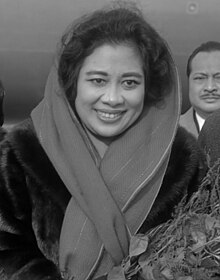Fatmawati
| Fatmawati | |
|---|---|

Fatmawati Soekarno (1966)
|
|
| 1st First Lady of Indonesia | |
|
In office 17 August 1945 – 12 March 1967 |
|
| President | Soekarno |
| Succeeded by | Tien Soeharto |
| Personal details | |
| Born |
5 February 1923 Bengkulu, Dutch East Indies |
| Died | 14 May 1980 (aged 57) Kuala Lumpur, Malaysia |
| Resting place |
Karet Cemetery Jakarta, Indonesia |
| Nationality | Indonesian |
| Spouse(s) | Sukarno |
| Children | Guntur Soekarnoputra Megawati Soekarnoputri Rachmawati Soekarnoputri Sukmawati Soekarnoputri Guruh Soekarnoputra |
| Religion | Islam |
Fatmawati (5 February 1923 – 14 May 1980) is a National Hero of Indonesia (Indonesian: Pahlawan Nasional Indonesia). As the first Indonesian First Lady, She was the third wife of Sukarno, the first president of Indonesia, and the mother of Indonesia's first female president, Megawati Sukarnoputri. She constructed the first flag flown by Indonesia.
Fatmawati was born on 5 February 1923 in Bengkulu to Hasan Din and Chadijah. One of her ancestors was a princess of a Minangkabau kingdom, Sultanate of Inderapura. When she met Sukarno she was a teenager and he was married to a 53-year-old woman named Inggit. Unsurprisingly, Sukarno's wife was unwilling to release her husband but, after two years, Inggit agreed to a divorce. Sukarno rationalised the need for his new wife by stating his desire to have a child to carry on his name.
In 1943 Fatmawati became the third wife of Sukarno and the following year gave birth to his first child, a son. Sukarno named his child Guntur meaning thunder. In 1945 she was his wife when Indonesia declared independence. The flag of the new country was sewn by Fatmawati, and the same flag was flown again every year until 1967. She was not his first wife, as he had married several times before. However, all his previous wives had been divorced in accordance with state law. Fatmawati was therefore his only wife at that time.
There was a growing movement to reform women's rights in Indonesia and part of this was to reform the marriage laws. Fatmawati was not initially in favour of reforming these laws until she found out about her husband's intentions to marry again. Moreover, this time Sukarno had decided that he did not want to divorce Fatmawati but intended to have two wives.
Fatmawati objected when her husband took Hartini, his new wife, according to Muslim law. Sukarno married another woman from Java in 1953 and Fatmawati moved out of the presidential palace and lived separately in Jakarta. As part of the settlement Fatmawati was allowed to keep the title of First Lady. This development was a major blow to the growing women's movement. Fatmawati decided that she was going to divorce the President, but she could not find a religious leader who was willing to oppose the will of Sukarno. The women's organisation consoled and advised Fatmawati and they tried to encourage her to return to the palace and reestablish her rights. Sukarno himself was annoyed by this development although his new wife understood Fatmawati's anger.
...
Wikipedia
